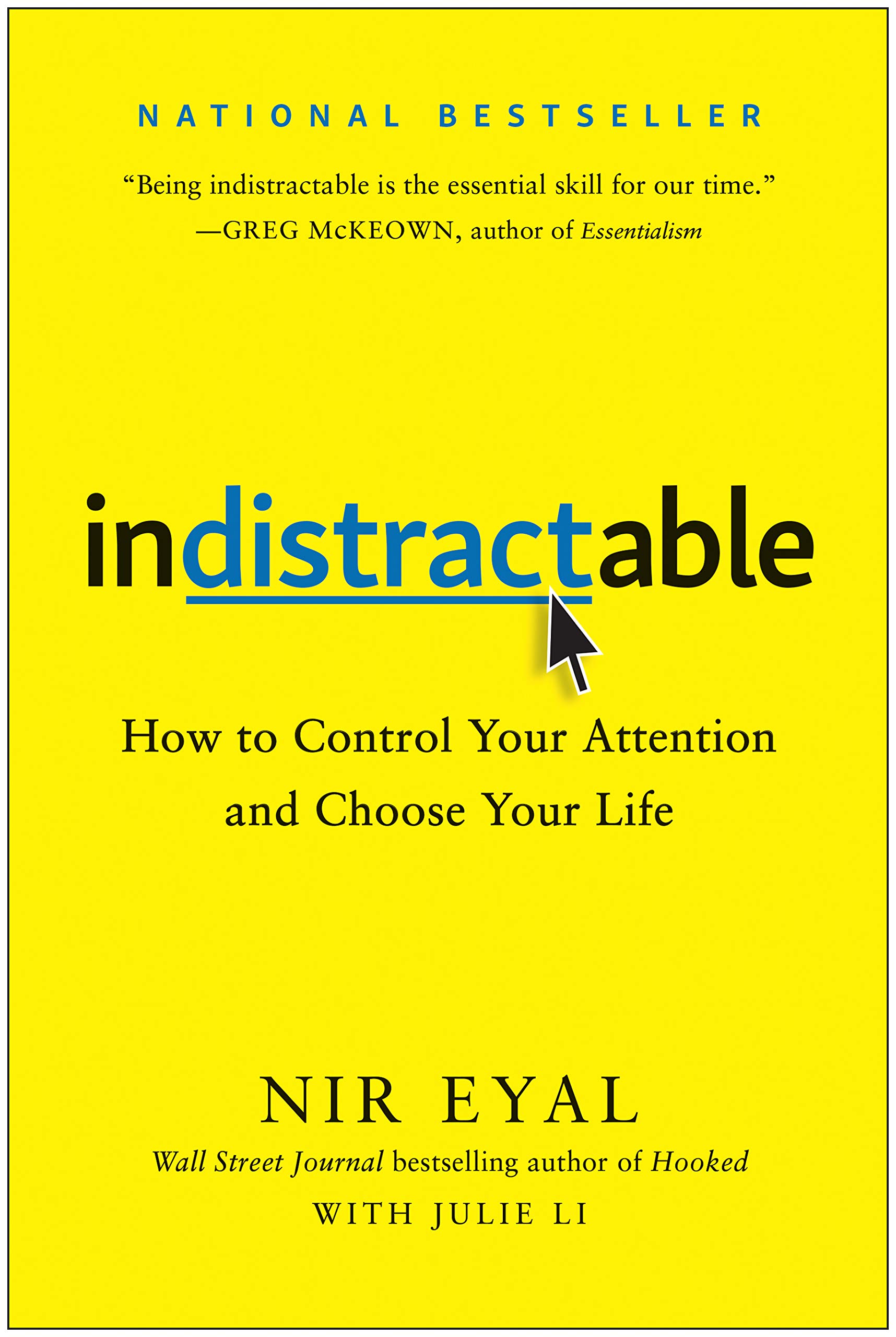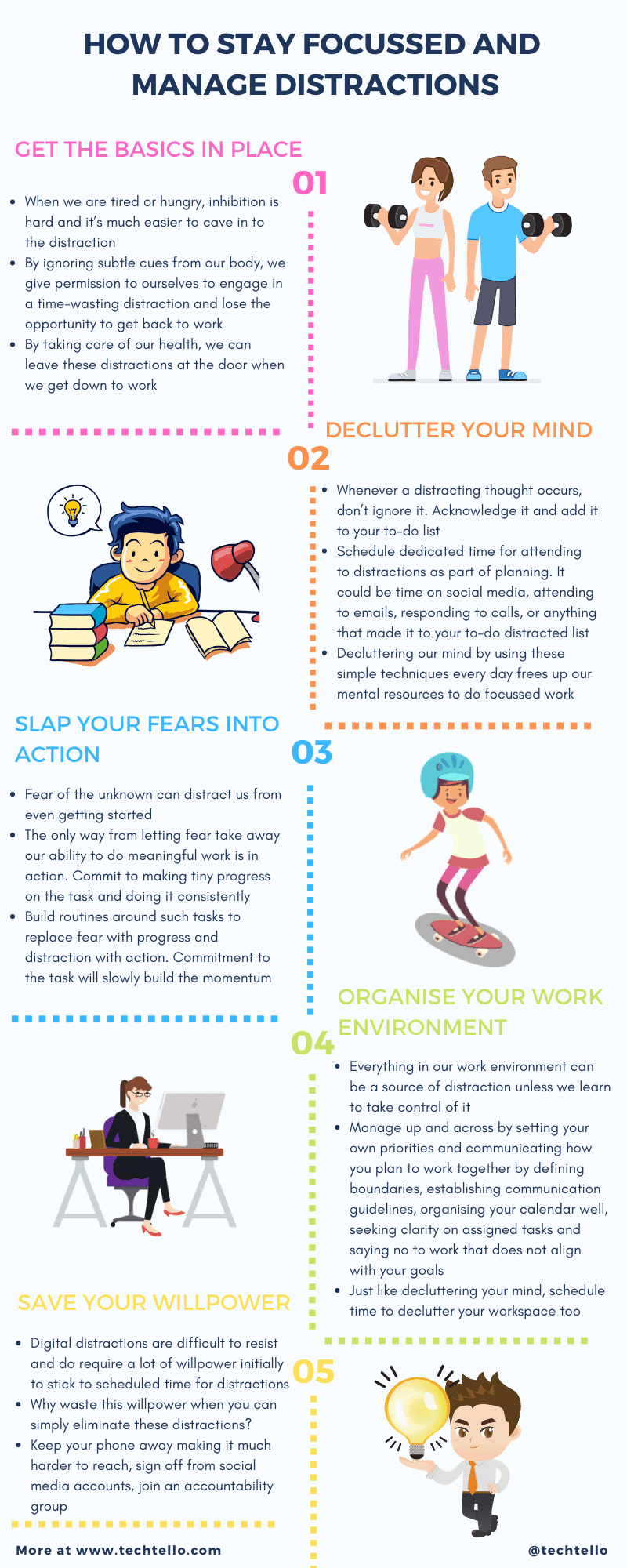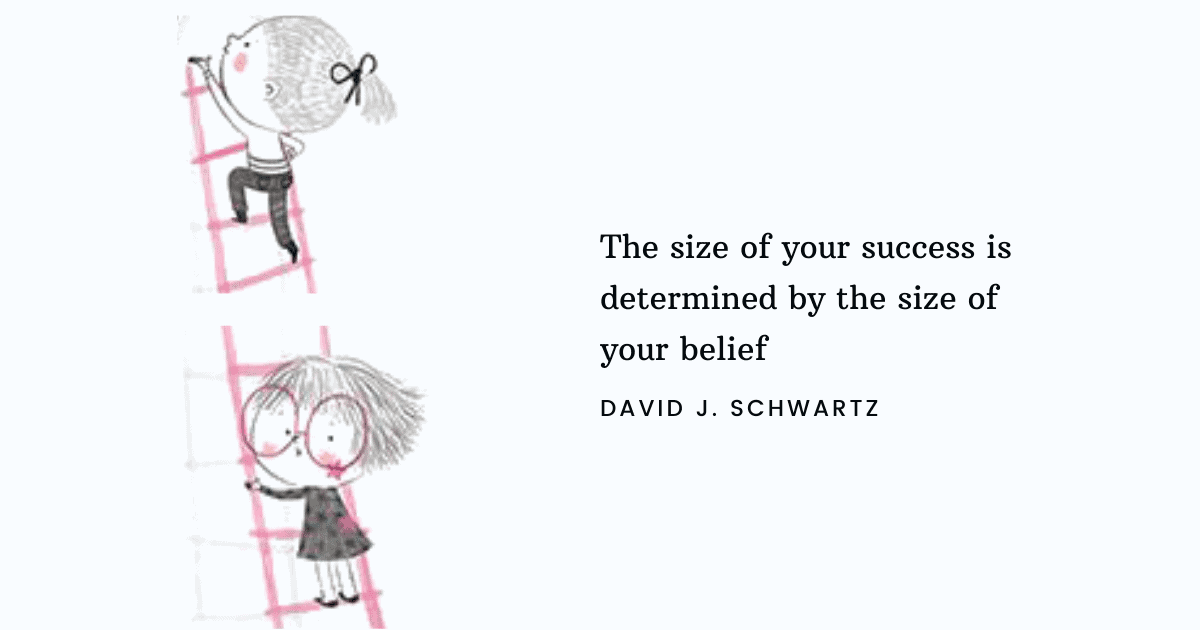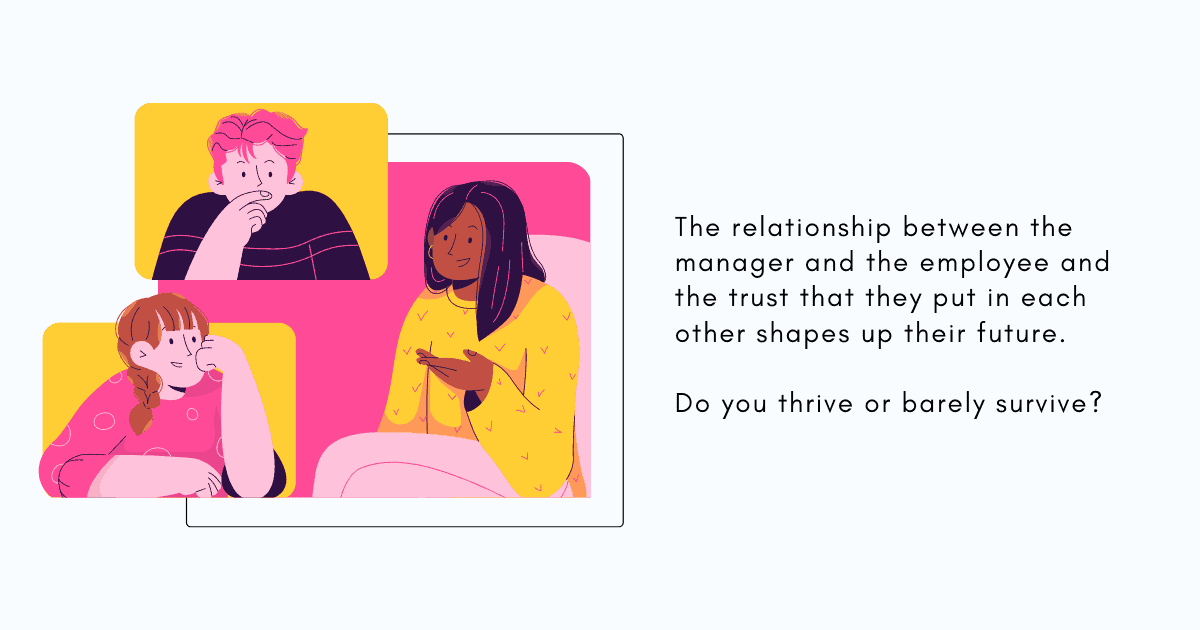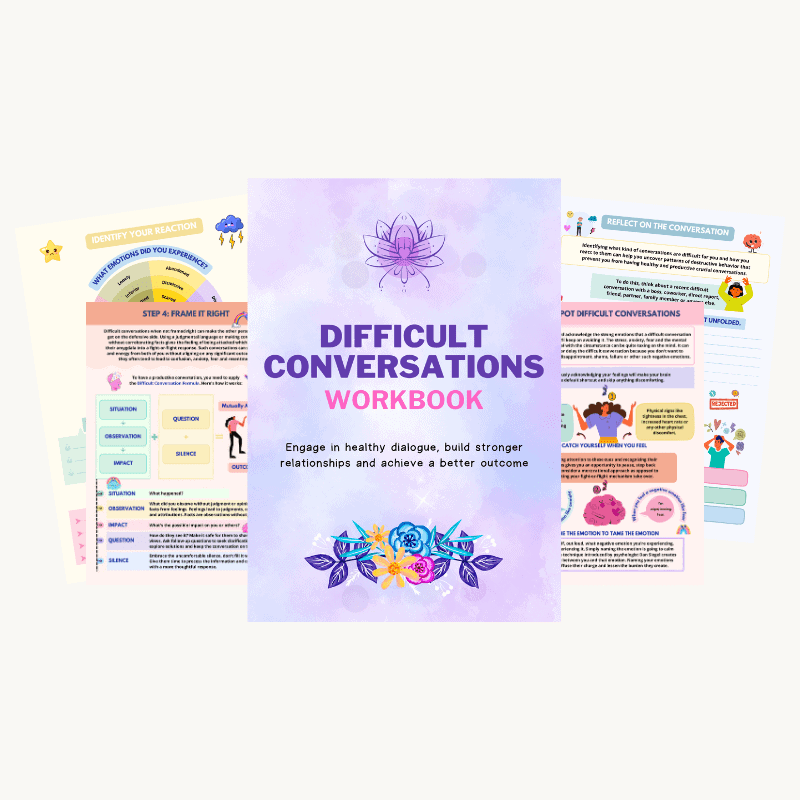How To Stay Focussed And Manage Distractions
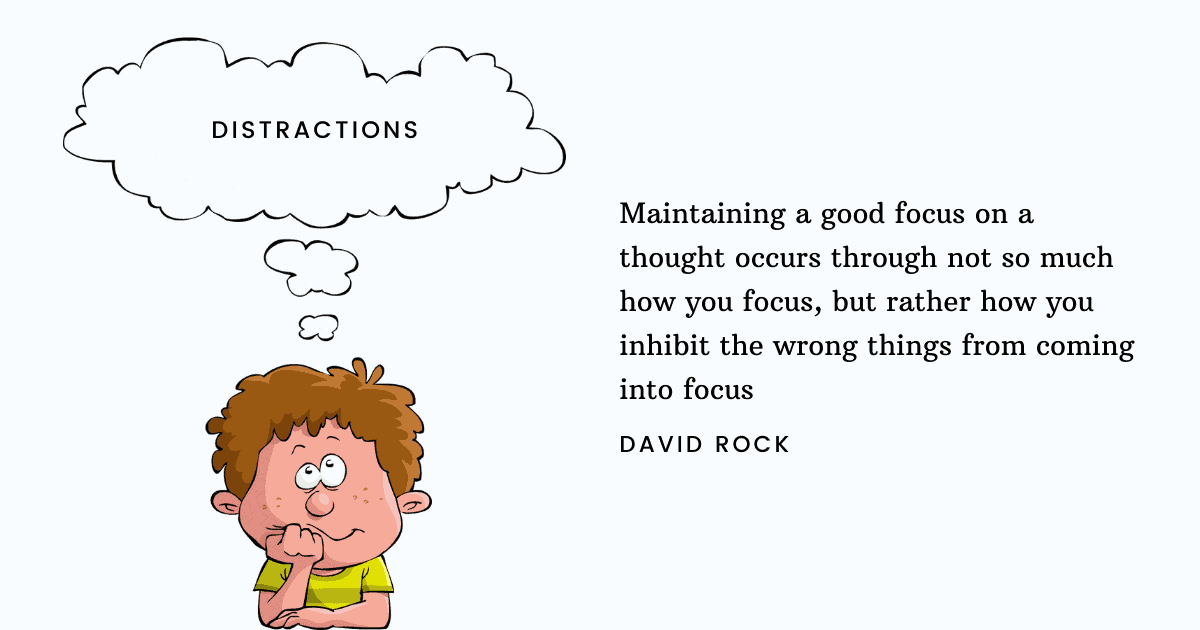
In a world that’s designed for interruptions, we are all vulnerable to distractions.
The sense of accomplishment that comes from producing great work rewards and energizes us to strive for more, be better at our tasks, and generate higher quality output.
We have all the necessary information, right tools, and resources at our disposal to achieve excellence and yet we rarely see it in practice.
The feeling that most people describe at work is one of relief as opposed to accomplished after finishing a task. They do not want to relive the experience and hate the idea of having to do it again.
It’s easy to qualify this feeling as a lack of proper resources, the complexity of the task, or having less time at hand to produce high-quality work. But, is that the reality?
Activities that diverts our attention from the task at hand, prevents us from focussing and distracts us from making the best use of our time contribute much more to our inability to achieve the best possible outcomes.
Distraction hijacks our mind and time when we are out to do some meaningful work. When we stop doing what we are doing and engage in a distraction, we let the activity deplete our mental resources leaving less pool of energy for the real work. Focus demands energy and a distracted mind is already exhausted to do any real work.
David Rock in Your Brain At Work
Distractions are not just frustrating; they can be exhausting. By the time you get back to where you were, your ability to stay focused goes down even further, as you have even less glucose available now. Change focus ten times an hour (one study showed people in offices did so as often as twenty times an hour), and your productive thinking time is only a fraction of what’s possible. Less energy equals less capacity to understand, decide, recall, memorize, and inhibit. The result could be mistakes on important tasks. Or distractions can cause you to forget good ideas and lose valuable insights. Having a great idea and not being able to remember it can be frustrating, like an itch you can’t scratch, yet another distraction to manage.
Distraction not only impacts the quality of our work, but our life too. Being able to focus requires us to have a strong sense of the kind of distractions that rule our lives and the ability to control them instead of letting them control us.
What are our biggest distractions?

It’s easy to get distracted, while staying focused and overcoming distractions requires taking control of our internal and external triggers.
Internal triggers relate to our mind and body (within us) while external triggers originate from our environment and things in it.
Distraction caused by demands of the body
Not eating well gives rise to hunger, lack of sleep causes us to feel tired and worn out and improper seating arrangement or air conditioning can make us feel uncomfortable.
Without attending to these necessities, we will be distracted by the demands of our body – our mind will be occupied with thoughts of food when we are hungry, we will have difficulty forming new ideas or processing information when we are tired and it will be a struggle to sit for long and do focussed work when our workspace is not aligned with our sense of comfort.
Ignoring the demands of our body and continuing to work can lead to feelings of frustration, anxiety and stress. As hard as we try to push ourselves in such moments, we will be unable to latch on to the right mental thread required for doing focussed work.
Distraction of the mind
Our mind wanders conveniently to another story of our life right at the time we get down to some important work and make an attempt to stay focussed.
Distraction of our mind could be a symptom of how we feel about the activity or a stream of completely unrelated thoughts driven by our tendency to overthink and over analyse our past actions or how the future will unfold.
Some common thought patterns that pull us away from the task at hand are:
- Being fearful of the task
- Procrastinating on how and where to start
- Lack of clarity on goals, expectations from this piece of work
- Not invested in the task and doing it only to please others
- Not taking the time to prioritise well and wondering about other activities we might do in its place
- Feeling of guilt from leaving other tasks unfinished or not taking time out to do them e.g. exercise, spending time with family, missing your child’s dance performance
- Being worried about whether others will like our work, how they will react and what they will say
- Thinking about our past actions and worrying about our social image based on what we said or did
- Picturing a future related or unrelated to this task
Mind-wandering is useful when it helps our mind make new connections, draw patterns or even recollect information that adds value to our work. Most of the time though, it leads to some inconsequential stream of thoughts that interferes with our ability to be productive in our work.
From Mihaly Csikszentmihalyi, Flow
Attention is like energy in that without it no work can be done, and in doing work is dissipated. We create ourselves by how we use this energy. Memories, thoughts and feelings are all shaped by how we use it. And it is an energy under control, to do with as we please; hence attention is our most important tool in the task of improving the quality of experience
Daily Weekly Monthly Planner Worksheets
Manage your to-do list, stay productive and cultivate healthy life habits with these planners.
Environmental distractions
Dysfunctional workplaces lack consciousness to optimise value creation by enabling quiet time for creative thinking and respecting each individual’s personal space to do focussed work.
People and noises in our environment can be our biggest source of distraction at work – employees dropping by our desk for quick discussions, a bad boss or a difficult employee who gets on our nerves and open office plans with constant chatter in the background.
There are other aspects of our work environment which are directly under our control and if not handled well can be a source of distraction
- Letting other people plan our day by keeping our calendar open and having meetings throughout the day instead of utilising specific blocks of time
- Keeping a cluttered work desk that makes it hard to focus
- Unorganised work device like a computer which is not optimised for efficiency can cause frustration and distract us from doing real work
It’s easy to fall victim to distractions that originate from others by believing that we aren’t at fault and cannot do anything to do away with them, but if they impact us, they are our responsibility. We cannot change how others plan to distract us, but we can change how we react to those distractions.
Digital distractions
Technology has made our life easier in many ways – we can connect with people all over the world, work anytime, anywhere and have access to a large number of services on our devices that adds value to our life.
However, being on all the time, not taking the time to switch off and not being conscious in adopting these technologies can be a continuous source of distraction that can prevent us from doing meaningful work, spend quality time with our family and give space to our brain to form new connections required for creative output.
Cal Newport talks about this in Deep Work
If you keep interrupting your evening to check and respond to email, or put aside a few hours after dinner to catch up on an approaching deadline, you’re robbing your directed attention centers of the uninterrupted rest they need for restoration. Even if these work dashes consume only a small amount of time, they prevent you from reaching the levels of deeper relaxation in which attention restoration can occur. Only the confidence that you’re done with work until the next day can convince your brain to downshift to the level where it can begin to recharge for the next day to follow. Put another way, trying to squeeze a little more work out of your evenings might reduce your effectiveness the next day enough that you end up getting less done than if you had instead respected a shutdown
Responding to every notification on our devices can release dopamine making us feel good in the moment, but it also takes away our ability to focus. Checking email frequently occupies our mental stage leaving less room for deep work and browsing through the endless feed on social media is a great way to kill time without being productive.
The problem is not the platforms or the technology behind them, it’s how we put them to use and make them part of our life.
How do you know if distraction is good or bad for you?

As David Rock says in Your Brain At Work “Maintaining a good focus on a thought occurs through not so much how you focus, but rather how you inhibit the wrong things from coming into focus.”
Distractions are not necessarily bad when they serve as a means to re-energise, reboot and ease out the activity that we need to do. Some distractions can actually work like a charm like the short and long breaks in Pomodoro technique designed to refuel our mind after 60-90 mins of focussed work.
When distraction is an escape path from the thing we are trying to avoid because it’s too difficult or painful, it’s easy to get distracted and do something else that gives us pleasure like finishing up that task on our to-do list that’s simple to do but doesn’t add much value, answering emails, chatting with the person in the next cubicle, reading an article or simply calling up an old friend to catch up.
Inhibiting our distraction in such moments requires asking these questions:
- What’s the uncomfortable truth I am trying to avoid through this distraction?
- Why do I need this distraction right now?
- What am I expecting to achieve from this distraction?
- Do I feel guilty engaging in this distraction at the cost of the work I need to do?
- Do I believe in my ability to solve this problem?
5 strategies to stay focussed and manage distractions
To stay focussed and build momentum, we need to dismiss behaviours that lead to distraction.
These moments of distraction do not ask for permission, they have an autonomy of their own. It’s like our other-self which conflicts with our desire to do focussed work, finds pleasure in distraction and doesn’t care much about achieving goals.
Without being self-aware of this distracted identity and attending to its core needs, all strategies will fail to be effective.
Also, what works for one may not work for the other. So, each one of us need to design our own personal system to make this distracted identity collaborate with our desire for focussed attention instead of fighting against it.
Here are a few methods I have adopted over the years that helps me personally align my distracted self with my focussed self to work better together:
Get the basics in place
When we are tired or hungry, inhibition is hard and it’s much easier to cave in to the distraction.
Instead of taking a break to eat when we are hungry or a nap when we are tired, we feel it’s simply not the right time to focus and choose to do something else instead. By ignoring these subtle cues from our body, we not only give permission to ourselves to engage in a time-wasting distraction, but rather lose the opportunity to get back to work after attending to those needs.
By taking care of our health – eating well and on time, taking proper rest and exercising, we can leave these distractions at the door when we get down to work.
Distractions can be sneaky though and once they cannot enter through our body, they can find their way through our minds.
Declutter your mind
One of the most effective techniques for managing priorities is to set aside 15-20 mins at the end of each day and plan 2-3 important tasks that we want to accomplish the next day. By setting up a plan upfront, there’s a higher likelihood that we do not give in to urgent tasks and let them take over our day at the cost of doing important tasks.
The Eisenhower productivity matrix is an effective framework to manage priorities.
As part of our planning process, if we choose to only schedule work that we want to accomplish and ignore the distractions, they will demand our attention right when we get down to work.
What if we schedule our distractions too and give them their own space on our plans?
Follow these practices:
- Whenever a distracting thought occurs in the moment, don’t ignore it. Acknowledge it and add it to your to-do list and then get back to work.
- If it’s a brilliant idea popping into your head, it will definitely demand a much bigger slice of your attention. Make it feel important by telling it so “You are important and deserve dedicated time. I am going to plan you today as part of my planning process”. Telling ourselves that we are going to attend to it gives permission to our brain to let it rest and move on.
- Schedule dedicated time for attending to distractions as part of planning. It could be thinking about the great idea that popped into your head the other day, taking time to introspect about your past decisions, spending time on social media, attending to emails, responding to calls, absolutely anything that made it to your to-do distracted list.
Decluttering our mind by using these simple techniques every day frees up our mental resources to do focussed work. It gives our distracted identity its own place so that it does not wreak havoc with our focussed self.
Slap your fears into action
Fear of the unknown – not knowing the outcome, what will be the challenges along the way, will we be able to finish it on time and how will others react to our work can distract us from even getting started.
The only way from letting fear take away our ability to do meaningful work is in action. Commit to making tiny progress on the task and doing it consistently even if the task is daunting.
Build routines around such tasks to replace fear with progress and distraction with action. You may find it hard to focus the first few days, but your commitment to the task will slowly build the momentum.
As David J. Schwartz said in The Magic of Thinking Big “Action cures fear. Indecision, postponement, on the other hand, fertilize fear. When we face tough problems, we stay mired in the mud until we take action. Hope is a start. But hope needs action to win victories.”
Pomodoro Planner Bundle
Break down your big goals into small tasks, limit distractions and build focus with this planner.
Once our distracted identity has learnt to collaborate with our inner self, it’s time to teach it to collaborate with the outside world.
Organise your work environment
Everything in our work environment can be a source of distraction unless we learn to take control of it – meetings demanding our time, colleagues wanting to chat, pantry urging us to pay a visit, bosses expecting an immediate response to their pings and even HR trying to get us enrolled in some employee wellness program or fill out a survey.
Manage up and across by setting your own priorities and communicating how you plan to work together by:
- Defining boundaries – what makes you most effective at work and how can others respect your personal space
- Establishing communication guidelines – when you respond to emails, how to reach out in case anything is urgent
- Organising your calendar well – agreeing to meeting slots and blocking time for focussed work
- Seeking clarity on assigned tasks – you cannot focus without knowing what’s expected from the task
- Saying no to work that does not align with your goals – taking on work that doesn’t add value can be demotivating and uninspiring, 2 big distractions to manage
On top of this, you will hit a jackpot if you can find a quiet corner in the office to do focussed work. If putting headphones on gives you the same vibe, that’s great too.
Just like decluttering your mind, schedule time to declutter your workspace too – that means an organised work desk as well as finding ways to optimise anything that can distract you while doing focussed work.
E.g. I love to maintain a huge collection of videos, articles and excerpts that have inspired me over the years in Evernote for easy storage and retrieval. Without this tool at my disposal, I would find myself highly frustrated and eventually distracted when trying to recollect a specific piece of information and unable to get to its original source. Evernote has taken away my distraction by making this information easily available.
Save your willpower
Digital distractions are difficult to resist and do require a lot of willpower initially to stick to scheduled time for distractions.
Why waste this willpower when you can simply eliminate these distractions?
To make the best use of your focussed hours of work, follow some of these practices
- Keep your phone away making it much harder to reach. This one has been my biggest source of productive work.
- Sign off from social media accounts. A simple barrier like login can make you think twice before opting for distraction
- Join an accountability group – members in this group can hold each other accountable for staying away from digital distractions. They can even share their stories regularly as a source of inspiration for others. Such groups can only work when people in the group are honest and ready to accept when they do give in to their urges. Having to answer back to the group can make you step back and think if you really need to engage in a distraction
- For every unscheduled distraction that you choose, knock off an item from the scheduled distraction list. It’s tit-for-tat for our distracted and focussed identities reminding them that they need to cooperate with each other
In the end, distraction is a part of being human. We enjoy novelty, find inspiration in determination and hope in progress. This world will be pretty boring with nothing to resist.
Healthy distractions rejuvenate us, help form new connections and make us find value in our work. Our distracted identity has its own place in our lives. We just need to acknowledge it and help it connect with our other identity that’s learning to focus.
How do you see these two identities play out in your work and life? Write to me or share your thoughts in the comments below.




